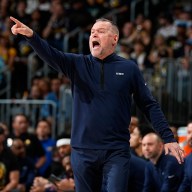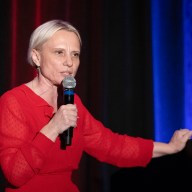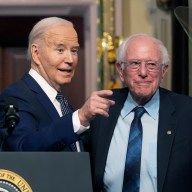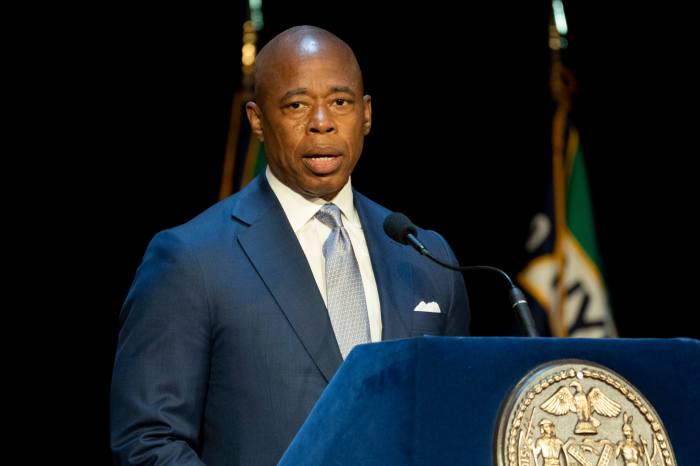They won’t be back on the air until the fall, but this week in Toronto, the dragons from CBC’s “Dragons’ Den” were breathing fire over the bailout of General Motors.
“That is a complete waste of money and an insult to the Canadian taxpayer,” venture capitalist Kevin O’Leary said of the federal and provincial government’s decision to loan GM $10.5 billion.
“The government has consistently proven it does a horrendous job of picking sectors and even companies. It should just stay out of it.”
O’Leary and the other four “dragons” – Arlene Dickinson, Robert Herjavec, Jim Treliving and W. Brett Wilson – just wrapped up work in Toronto on a fourth season of the hit CBC series.
It will return in the fall with 20 new episodes, up from 12 in 2008-09.
Ratings jumped 40 per cent last season, and an American network version of the series – retitled “Shark Tank” and backed by reality guru Mark Burnett – is coming soon to ABC.
What’s more, the savvy executive producer hired two of the Canadian dragons – O’Leary and Herjavec – to swim in his U.S. shark tank.
Maybe he recognized that these Canuck money men are not afraid to speak the blunt truth on television, an approach that has been pretty effective for people like Simon Cowell and Donald Trump.
O’Leary, who is also a commentator on BNN, blasted the Canadian governments for the multibillion-dollar auto sector bailouts.
“This is a legacy left for the next generation of debt and inefficiency that’s horrendous,” he said. “I think you’re going to see in the next 20 years other economies that don’t do this kind of thing surpass North America.”
The downturn in the economy has had a direct impact on the series. The dragons have seen more pitches from new entrepreneurs who are trying to reinvent themselves after downsizings and layoffs.
This week, folks from across Canada arrived at CBC’s downtown Toronto studio to pitch everything from pet products to pizza ovens.
“I think there’s something real about it,” says Dickinson. “I think people at home can see themselves down in there pitching their own ideas. We all can relate to it.”
O’Leary, of course, puts it in blunter terms: “There’s something very visceral about watching people beg for money.”
And there is money on the table. All five dragons are multi-millionaires who stake their own cash in any “Dragons’ Den” deals.
Wilson, by far the biggest player the last few seasons, figures the team invested in between 35 and 40 deals this coming season.
“Everybody stepped up this year,” he says.
Not all for the same reasons. O’Leary says he smelled an opportunity. The recession and tighter bank money has led bigger players to the dragons’ door.
“We’re seeing lots of mid-cap companies with real revenues coming on the show trying to find capital,” he says. “We’re definitely taking advantage of the situation.”
Herjavec agrees it’s a dragons’ market.
“We’re seeing businesses that in the first three years would not have come on the show,” he said, singling out one individual who had orders for worldwide distribution of a great product who couldn’t get funding elsewhere.
“We’ve never seen that before.”
Dickinson agrees there are more opportunities. Approached by one entrepreneur who needed cash for business travel, the marketing professional bought into the company by trading airline points for an ownership stake.
Wilson, a former investment banker in the oil and gas sector, backed a young inventor last season who pitched a unique “Uno” motorcycle.
He says he invests more in individuals than ideas.
“He’ll bring his next invention to me, and the next one,” says Wilson. “I’m looking at building a 20 year business relationship.”
The dragons engage in the same kind of off-air rivalry that has made millions for Cowell and Paula Abdul. O’Leary says it is Wilson’s “social conscience” that leads to many of his deals.
“I don’t come here looking for new charity cases,” he quips. “I already give.”
Wilson counters that some dragons “look for reasons not to do a deal. This isn’t about ego for me, I don’t need to be here, but it is a lot of fun.”
He even hired someone full time this year just to help him keep on top of his “Dragons’ Den” ventures.
All the dragons say they benefit directly from the exposure they get on the series. Treliving, who lives in Texas and also has a home in Vancouver, says he turned down the first few requests he got to join the series.
Now he’s flooded with requests from his Boston Pizza managers to visit his many franchises in person.
The former Mountie used to hire people like Howie Mandel to pitch his pizzas. “Now I can do it myself, and I don’t cost as much,” he says.
–
Bill Brioux is a freelance TV columnist based in Brampton, Ont.
















